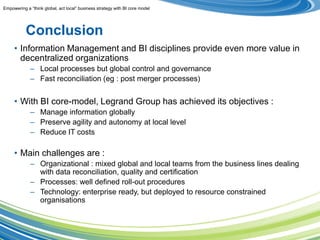


Business analytics may include dashboards, visual graphics, charts, etc.
#Decentralized business intelligence definition series#
Typically, business intelligence can be used for ad hoc analysis using visualization tools.Īnalytics is the outcome of a series of advanced operations performed on data extracted from business intelligence systems. What came to be known as BI tools evolved from earlier, often mainframe-based analytical systems, such as decision support systems and executive information systems. Sporadic use of the term business intelligence dates back to at least the 1860s, but consultant Howard Dresner is credited with first proposing it in 1989 as an umbrella phrase for applying data analysis techniques to support business decision-making processes. Reducing organizational strains related to data issuesīusiness intelligence (BI) is a technology-driven process for analyzing data and presenting actionable information to help executives, managers and other corporate end users make informed business decisions.Enable better decision making in the end to end supply chain.
 Increasing revenue through improved customer-facing responsiveness. Ensuring better compliance, security and privacy. Improving transparency through socialization, dissemination and creation of awareness. Providing ways to resolve existing problems related to data (such as quality, availability, security etc.). Standardizing policies, standards, procedures and systems related to data. Decreasing the cost of managing data through synergies with other organizations. Enhancing existing processes and build additional processes that work better. Increasing the value of your existing data by identifying ways to utilize it. Ī data governance program can provide many benefits, including, In effect, data governance provides a system of decision rights and accountabilities for the information-related processes, executed according to agreed-upon models which describe who can take what actions with what information, and when, under what circumstances, using what methods. The basic components of data governance ensure the split of accountability and responsibility related to data thus empowering better decision making while using data from disparate data sources and methods. Every organization needs to define for themselves the differences between these terms, and not just bend to how external consultants are professing to position their views on these concepts.ĭata Governance” is the exercise of authority and control (planning, monitoring, and enforcement) over the management of data assets. An important differentiation between data governance, business intelligence, business analytics cognitive analytics and predictive analytics is needed as a basis for building a digital supply chain strategy.
Increasing revenue through improved customer-facing responsiveness. Ensuring better compliance, security and privacy. Improving transparency through socialization, dissemination and creation of awareness. Providing ways to resolve existing problems related to data (such as quality, availability, security etc.). Standardizing policies, standards, procedures and systems related to data. Decreasing the cost of managing data through synergies with other organizations. Enhancing existing processes and build additional processes that work better. Increasing the value of your existing data by identifying ways to utilize it. Ī data governance program can provide many benefits, including, In effect, data governance provides a system of decision rights and accountabilities for the information-related processes, executed according to agreed-upon models which describe who can take what actions with what information, and when, under what circumstances, using what methods. The basic components of data governance ensure the split of accountability and responsibility related to data thus empowering better decision making while using data from disparate data sources and methods. Every organization needs to define for themselves the differences between these terms, and not just bend to how external consultants are professing to position their views on these concepts.ĭata Governance” is the exercise of authority and control (planning, monitoring, and enforcement) over the management of data assets. An important differentiation between data governance, business intelligence, business analytics cognitive analytics and predictive analytics is needed as a basis for building a digital supply chain strategy.







 0 kommentar(er)
0 kommentar(er)
